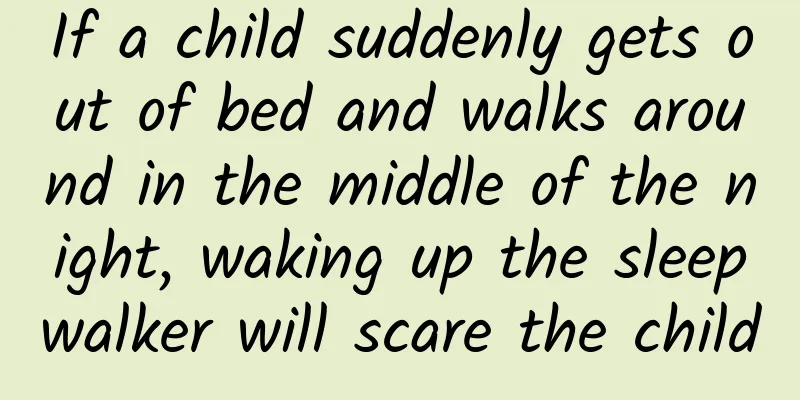If a child suddenly gets out of bed and walks around in the middle of the night, waking up the sleepwalker will scare the child

|
9-year-old Lele (pseudonym) has recently been waking up suddenly and walking around and touching things 1-2 hours after falling asleep at night. At first, his family thought that the child wanted to go to the toilet, but the attacks continued for a week and the child had no memory of it. After a sleep monitoring at the Sleep Medicine Department of Wenzhou No. 7 People's Hospital, he was diagnosed with "childhood nocturnal paranoia" (commonly known as sleepwalking). Sleepwalking is a common sleep disorder that occurs in children aged 4 to 12. It is important for parents to understand how to deal with and manage their children's sleepwalking. The following are the key points to pay attention to: 1. Ensure environmental safety: the first line of defense When sleepwalking occurs, children appear to be awake, but are actually unconscious, making accidents more likely to happen. Parents need to: 1. Remove dangerous items: Check your room before going to bed and put away sharp objects, glass, electrical sockets, etc. 2. Door and window protection: Lock the doors and windows, and install guardrails on the balcony to prevent children from climbing unconsciously. 3. Prevent children from tripping or falling: Clear the floor of debris and place cushions next to the bed to prevent children from tripping or falling and getting injured. 4. Night monitoring: You can install low-brightness night lights or monitoring equipment in the room to observe your child’s behavior. 2. Avoid forced awakening: gentle guidance is the key The traditional idea is that "waking up a sleepwalker will scare the child", although there is no scientific basis for this, but it is important to note: 1. Sudden awakening is not recommended: If a child is forcibly awakened during a night outing, he or she may cry, become frightened, etc. due to confusion. 2. Correct approach: Comfort gently, hold the child's hand and slowly guide him/her back to the bed, avoid pulling or scolding directly. 3. Do not mention it the next day: Children have no memory of the night parade, and repeated discussions may increase their psychological burden. 3. Adjust your sleep habits: Reduce the causes The following measures can reduce the frequency of sleepwalking episodes: 1. Regular work and rest schedule: set a fixed bedtime and wake-up time, and the schedule should not change by more than 1 hour during holidays. 2. Ensure adequate sleep: School-age children need to sleep 9 to 12 hours a day. Insufficient sleep can easily induce night wandering. 3. Relax before bed: avoid strenuous exercise, listen to light music, and read with your children. 4. Diet management: Do not eat too much for dinner, and avoid consuming caffeinated foods (such as chocolate, milk tea) 2 hours before going to bed. 4. Pay attention to psychological pressure: emotional management cannot be ignored Some children's sleepwalking is related to anxiety, tension and other emotions. Parents should pay attention to: 1. Reduce academic pressure: Avoid criticizing your children or discussing sensitive topics such as test scores before bedtime. 2. Create a sense of security: Strengthen children’s psychological support through parent-child games, hugs, etc. 3. Be alert to environmental changes: After stressful events such as moving, transferring schools, family conflicts, etc., you need to pay more attention to your child’s sleep status. 5. When do you need medical treatment? Most children's sleepwalking will heal itself as they grow older, but the following situations require prompt medical attention: 1. The frequency of attacks suddenly increases (e.g., ≥ 2 times per week) or lasts for more than 30 minutes. 2. Engage in dangerous behaviors (such as trying to open the door to go out or climb through the window). 3. Accompanied by other abnormal symptoms: such as bed-wetting, screaming, apnea or daytime sleepiness. 4. If the symptoms do not improve after puberty, it may be necessary to rule out diseases such as epilepsy and sleep apnea. Although children's sleepwalking is worrying, it usually has a good prognosis through scientific management. Parents need to remain patient and work closely with doctors based on the principle of "protecting safety, reducing inducements, and regular follow-up" to help their children smoothly pass this stage. The Sleep Medicine Ward Center of Wenzhou No. 7 People's Hospital reminds: If a child has abnormal sleep, it is recommended to conduct polysomnography (PSG) as soon as possible, and formulate an individualized intervention plan after a clear diagnosis. |
<<: Asymptomatic ≠ Not Infected, Let’s Get to Know This “Hidden Silent Killer”
Recommend
How to make Tongcao stewed crucian carp to increase milk secretion
Everyone has eaten Tongcao, it is a very common C...
What are the methods for women to lose weight in the abdomen
We all know that having a good figure is very imp...
What is the cause of painful urination with blood?
It is very painful when urinating, and this pheno...
Women, why do your private parts hurt?
Chronic vulvodynia is more common among women in ...
What is the reason for 3 plus white blood cells in leucorrhea examination?
The most troublesome thing about going to the hos...
How long after taking the ovulation injection should I have sex?
In order to increase the probability of pregnancy...
Why is the electric vehicle battery so hot when charging? Where is the electric vehicle certificate number?
Electric vehicles are a very convenient means of ...
What is the reason why the gas water heater cannot ignite? How to solve the problem that the gas water heater does not produce hot water
A gas water heater, also called a gas water heate...
How to remove the residue of abortion
Abortion is the most decisive way to terminate pr...
Why do people feel cold after abortion?
In today's society, young girls often have un...
Evercore ISI: Apple App Store revenue will grow 12% year-on-year in August 2024
Despite challenges in some parts of the world, Ap...
What should women pay attention to in autumn beauty
Everyone loves beauty. For female friends, a beau...
Pregnancy test right adnexal cyst
After a woman becomes pregnant, she needs to take...
The main causes of infertility after miscarriage
If a woman becomes pregnant unexpectedly and unde...









